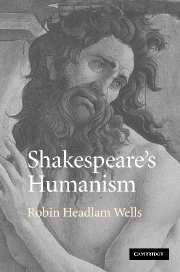3 - Value pluralism
Published online by Cambridge University Press: 22 September 2009
Summary
‘Hath not a Jew hands, organs, dimensions, senses, affections, passions?’ (The Merchant of Venice, iii.i.55–6). Shylock's most famous speech has been read by many critics as a defence of the persecuted outsider. With its powerful rhetoric and its sense of the dignity of the human spirit, this is one of Shakespeare's great set pieces, comparable with Henry V's meditation on the cares of kingship, or even Hamlet's soliloquy on suicide. Appealing, as he does, to a universal humanity that transcends ethnic and cultural differences, Shylock comes across, not just as the victim of Christian prejudice, but as a tragic figure of almost heroic proportions. Yet within half a dozen lines he has metamorphosed into a pantomime buffoon. As Tubal's ‘bad’ news of Jessica's betrayal alternates in symmetrical sequence with the ‘good’ news of Antonio's misfortunes, Shylock's ludicrously exaggerated reactions make him an obvious target for the mockery of the street boys who follow ‘crying “His stones, his daughter, and his ducats!”’ (ii.viii.24). What are we to make of such contradictory images? Was Shakespeare sympathetic to the Jewish outsider? Or did he share the anti-Semitism that was the norm in late medieval and Renaissance Europe?
It's understandable that, after the greatest crime against humanity in recorded history, twentieth-century criticism should have been preoccupied with Shakespeare's treatment of the Jewish question (even to the extent of claiming that Shakespeare himself was a Jew).
- Type
- Chapter
- Information
- Shakespeare's Humanism , pp. 50 - 66Publisher: Cambridge University PressPrint publication year: 2005



